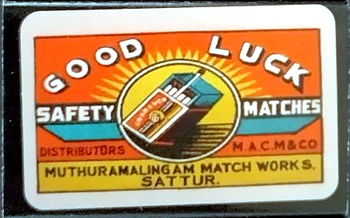 Although literature on the subject is almost nonexistent, matchbox spells have likely existed as long as there's been matchboxes. They are far less publicized as say, mojo bags or spell jars. My first introduction to matchbox spells was in 1981 via a local Tennessee card reader, who instructed a client to bury a matchbox near the doorstep where an abusive man would walk over it as he entered and left the house. Within three weeks, the terrible man, blind drunk, drove his car into a tree and died.
Although literature on the subject is almost nonexistent, matchbox spells have likely existed as long as there's been matchboxes. They are far less publicized as say, mojo bags or spell jars. My first introduction to matchbox spells was in 1981 via a local Tennessee card reader, who instructed a client to bury a matchbox near the doorstep where an abusive man would walk over it as he entered and left the house. Within three weeks, the terrible man, blind drunk, drove his car into a tree and died.
Some years later, I was told of a professional gambler who smoked cigars, so a matchbox on the table wasn't out of place. This matchbox, however, contained a tiny mojo hand fixed for luck. The gambler would fiddle with the matchbox during the play, and nobody paid any attention to what seemed a nervous habit, but here's the trick: When the game wasn't going his way, he would turn the matchbox over, effectively turning his luck around!
Matchbox spells are intentionally simple, with few ingredients. Like much in spellwork, quantity does not necessarily equal quality. Materials placed in matchboxes should be large enough, and solid enough, not to leak out when the box is shaken. Some dried herbs and small seeds might need to be contained in a packet before being placed in a matchbox.
Matchbox spells are fragile, but deliberately so. This quality of fragility guarantees the spell will be temporary. They aren't designed to be long lasting. Many matchbox spells are buried in the ground, where they will degrade within one to two weeks. I call these time-released spells. Some matchbox spells, when finished, can be thrown in a fire, or in running water, where they will be quickly destroyed. It's this impermanent nature of the matchbox spell that gives it its appeal. A destruction box can be made and tossed in a fire for an instantaneous and explosive effect!

